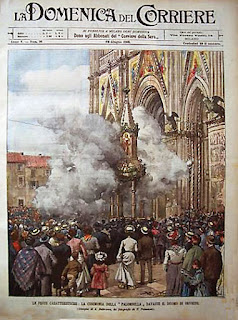I made the mistake yesterday of going to the local grocery store during the noon rush. Here, as in most small villages in Italy, things shut down around 12:30 or so for the afternoon riposo. So, right around this time, the grocery store is packed with people headed home from work or from school to pick up a few things for lunch. Italians don't shop for groceries once a week, but, because they can so easily walk to the grocery store, usually go every day or couple of days.
Looking at this idea of riposo (or siesta in Spanish, which you might know better) from an American cultural viewpoint, we might consider this unproductive. And unnecessary. A waste of good working or learning time. This tradition, though, came out of necessity, especially in more southern places where the heat of the day can be intense. Buildings weren't air conditioned. It was dangerous for workers to be outside in these high temperatures. So, this cultural phenomenon developed. Everyone goes home to have lunch and to rest. Then, around 5p, when things started to cool down, they return to work and school for about another 3 hours or so.
This is possible when you live and work and go to school in a small village because you live within easy walking distance of everywhere you need to be. School is a 5-10 minute walk away. The grocery store and other shops are the same. So, are workplaces. By slowing down the pace of life, spending time together, meeting one another on the street as you're walking to and fro, and even running into each other in the grocery store during the noon rush - all of this creates community. Add into it the evening tradition of the la passeggiata - an evening stroll where the entire family goes out and walks the main corso together, running into friends and other family members, catching up on the news of the day - then followed by another time of gathering together for a meal that often stretches late into the evening, and vita comunitaria (communal life) just happens. Naturally. All the time.
During the period of the Middle Ages, all three of the major religions - Judaism, Islam and Christianity - innovated their spiritual traditions centered around the idea of God as lover and human beings as beloved, an acknowledgement of the feminine in spirituality. The many rich and abundant texts by female mystics were composed in and for very specific communities. As urban centers grew, the need for pastoral care in towns and cities required greater lay participation. Lay women and men organized themselves into these communities, some endorsed by the Church and others not. Spirituality was formed in community. Pastoral care was offered from within these communities. Even in the U.S., up until the individualism of the 20th century, much of faith life was developed through communal life.
My time in Orvieto reflecting on vita comunitaria, both past and present, makes me recognize that we've lost something in America. Faith is meant to be shaped and lived out communally. Each of us is blessed by God with unique gifts to serve that community, which then offers them more fully in greater society. We are called to be the body of Christ, working together, then sent out to perform what Ulrike Wietnaus calls "street mysticism." It is on the streets where we find sacred space like the feminine mystics did - in the open spaces of markets, churches, shrines dedicated to the saints, shops, apothecaries, roads and hospitals. It is on the streets where the spiritual and the secular mix. (Perrin, 4-7)
This Sunday is Pentecost Sunday. It's a huge festival in Orvieto that celebrates the outpouring of the Holy Spirit on the Apostles. Here, it is celebrated in the streets of this village - communally - with a Vigil mass, processions, an art festival, an evening dance, then culminating on Sunday with the palombella, an ancient aerial transit of a dove (la columba) from the Church of St. Frances (Chiesa de San Francesco) to the duomo with fireworks. (I promise to take pictures as long as you don't show them to PETA!) Here, the sacred intermingles with the secular. There is no separation. One can only wonder how much fuller the lives of Orvietans are because these two aspects of life - and our very beings - aren't separated from each other, but fully intertwined as part of life together.
Something to think about on this Vigil of Pentecost. Fino a tardi!

No comments:
Post a Comment